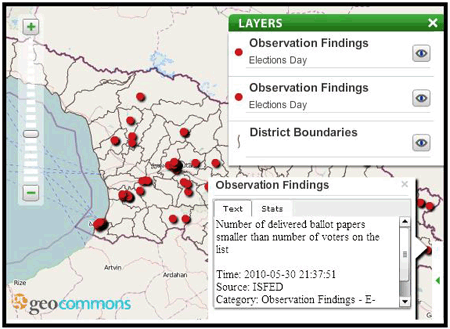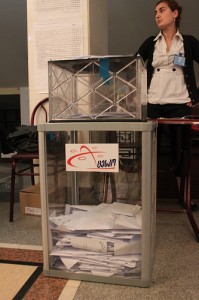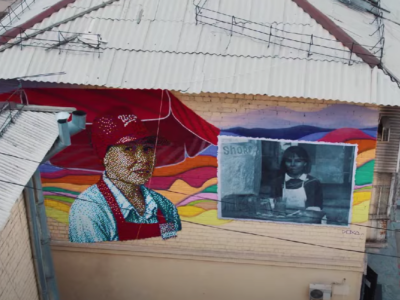Local government elections in Georgia, including a much anticipated vote to elect the Mayor of Tbilisi, the former Soviet republic's capital, were held on 30 May and attracted huge interest from both the local and international community. Considered another test of Georgia's fledgling democratization process, both deployed and relied on online and social media technologies to monitor the vote perhaps as never before during any other previous election held in the country or, indeed, the region.
For about two months prior to the election, reports and monitoring on media coverage, including the use of administrative resources by the incumbent mayor, the candidate of the ruling National Movement party of the Georgian president, were widely spread via email, websites and Facebook. The popular social networking site also served as one of the main platforms for public debate about the candidates and the local elections in general.
On election day itself, a media center set up by the Georgian Young Lawyers Association, Transparency International Georgia, and the International Society for Fair Elections and Democracy (ISFED) ran press-conferences every hour, using mailing lists and Facebook to spread information and announcements. Shortly before the vote, as well as during the election day itself, a website set up by the Civic Development Institute allowed citizens to submit reports on violations via text messages, phone calls or e-mails.
Transparency International Georgia also deployed a real-time online system based on information pulled from several observer organizations on a specially launched website, VoteGeorgia.Ge. The initiative marked the first time such a mapping system was known to be deployed for elections in the South Caucasus.

A day before the vote, the Georgian branch of the Institute of War and Peace Reporting (IWPR) also set up their own special coverage site, GeoElection.Ge [GE] and hired several bloggers, training them in election reporting before sending them out to different precincts to monitor as well as spread information through their own online networks. Some of those reports materialized over half an hour earlier than news reported by professional journalists on the same website, as Dodka [GE], a blogger and coordinator of that section, mentioned in her Facebook status.
Others also recognized how important the extensive online coverage was.

Blogging was also used to inform readers of the mainstream media with journalists from the leftist and critical Liberali magazine blogging from different precincts and political party offices on election day, while Caucasusreports, a news blog contributed to by Georgian, Azerbaijani and Armenian students from the Caucasus School of Journalism and Media Management at GIPA in Tbilisi, ran reports. In one post, for example, a Georgian journalist blogged about the lack of interest in the local elections from many, while another wrote about the opposite attitude from first-time voters.
Tornike Nikvashvili is one of those who went to the polling station for the first time. He thinks that as a citizen of the democratic country his vote has a big importance.
“This is my first elections and voting is my civil duty. I hope my vote will contribute my country in some way. So, I’ll see what results my first elections will have”.
“All my friends participate in the elections. They all are sure that with this, they can play an important part in the future of the country”, he also added.
The coverage also included reports from the Marneuli region, an area mainly populated by ethnic Azeris, but also by ethnic Armenians and Georgians. Two students reported from the mainly ethnic Armenian-populated village of Shahumian.
Out of five local Sakrebulo candidates in the village Shahumian, Marneuli region, two are Armenians and three – Georgians. Four polling stations are working in the village. […] The village where 80 percent of population is comprised of Armenians has a lot of isuess but with the coming of the new elections the old promises are being forgotten.
[…]
Being on the borders of two countries, Armenia and Georgia, the villige lacks access to information badly. They don’t have Georgian TV and Radio broadcasting or get newspapers. Only those who have satelite dishes can watch Georgian channels.
Meanwhile, Ali Resh and a mixed group of Armenian and Azerbaijani students reported on how the vote was conducted in mainly ethnic Azeri villages. This included videos showing an incident where multiple voting was observed. In the first video, election commission members turn those having already voted away while journalists were present until giving up in the second.
In Tbilisi, after results indicated that the current mayor, George Ugulava, had been re-elected with 55 percent of the vote as compared to the runner-up, main opposition candidate and former UN Ambassador Irakli Alasania who received just 19%, bloggers naturally commented. Evolutsia.net gave an in-depth analysis of the results, considering that President Saakashvili's National Movement party had “been rewarded for progress” while also noting that there is “a real market in Georgia for a credible, moderate opposition.”
Interestingly enough, Tbilisi, which gave majority votes to the opposition in the hotly-contested 2008 presidential elections, this time around swung back to the UNM, indicating that opposition-inclined voters were unconvinced and unenthusiastic about the current crop of opposition candidates.
Instead, the elections might be taken as an indication that there is a considerable pool of support for an opposition, but not if it appears immature, endangers economic growth, or is willing to sacrifice Georgian sovereignty. In short, certain segments of the Georgian population could be persuaded by a centrist alternative to Saakashvili’s UNM.
DAVID.GE 2.0 ბლოგი [GE] also summed up the vote in a Post-election Post, comparing the average voter to a consumer who has gotten used to wearing old, but relatively comfortable shoes at the same time as seeing a TV commercial for a newer, more attractive pair by another manufacturer. Meanwhile, the analogy continued, the producer of their existing shoes promises a newer design based on customer feedback.
თქვენს თვალწინ დგება არჩევანი: დაელოდოთ რევოლუციურ ფეხსაცმელს, თუ კი ის ოდესმე მაინც იწარმოება, ან წახვიდეთ და იყიდოთ თქვენი შეჩვეული ფეხსაცმლის ახალი ვარიანტი, რომელიც როგორც მინიმუმ იმაზე უარესად არ გეჩვენებათ რაც ახლა გაცვიათ, დღესვე ხელმისაწვდომია და თანაც ახალ კომფორტსაც გპირდებათ.
რას აკეთებთ თქვენ?
So what do you do?
The post, humorous rather than completely serious, became popular on Facebook while the answer to the question and dilemma posed appears to have already been answered for many.








4 comments
IWPR have also posted something on their online coverage, a collaboration between traditional journalists and bloggers:
http://www.facebook.com/l.php?u=http://iwpr.net/report-news/georgia-election-blog-hit&h=74d83
Dear Sirs,
I have translated this article. I just want to know how to submit it
Thanks